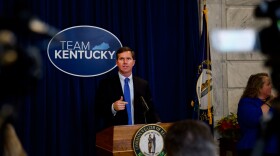Federal guidelines have so far prioritized the sick, the vulnerable and health care workers for coronavirus testing. That’s vital for directing care and resources right now, but as the pandemic continues and testing capacity grows, practices will need to change if we want to understand how far this virus has spread.
If we only test targeted populations, then we skew the data set and ultimately, our understanding. That’s why Dr. Aruni Bhatnagar, professor of medicine at University of Louisville, says the city should consider randomized testing. And the city of Louisville may give it a try.
Randomized testing for coronavirus is underway in Iceland and will be tried in Norway, according to media reports.
Bhatnagar currently serves as the director of the Christina Lee Brown Envirome Institute at U of L. He's renowned for developing the field of environmental cardiology and has spent more than 25 years studying heart health. What's relevant here is that Bhatnagar knows how to setup an experiment.
In 2018, he completed a study of 400 Louisvillians that found people who live in green spaces have better cardiovascular health independent of their socioeconomic status. He has also spearheaded Louisville's Green Heart Project — a multi-million dollar experiment studying the effect plants and trees have on human health.
Coronavirus Cloak Of Invisibility
The novel coronavirus that causes COVID-19 is unique in many respects including its transmission rate and lethality, but one of the most significant challenges is the length of time the virus can go undetected before a person begins showing symptoms.
The U.S. Centers for Disease Control and Prevention says symptoms including a dry cough, fever and shortness of breath can appear two to 14 days after exposure.
In a CDC study of COVID-19 outbreaks on cruise ships, 17.9% of those infected on the Diamond Princess never developed any symptoms at all. More than 46% percent of them were asymptomatic when they were tested.
The researchers concluded that "cloak of invisibility" may explain the high rate of infection among cruise ship crew and passengers.
What’s special about that cruise ship study is that researchers were able to test people did and did now show symptoms, but that’s not what’s happening around the country.
“That’s why it’s so critical to see how many of these silent carriers are there in our communities,” Bhatnagar said.
How Randomized Testing Would Work
The U.S. was slow out of the gate in tracking the spread of the virus. Infectious Disease Expert Dr. Anthony Fauci told Congress the CDC was not designed to test at the levels currently necessary. Rather than accept a functional test developed by the World Health Organization, the U.S. decided to make its own coronavirus test. The test they developed malfunctioned and states have since found a workaround.
The New York Times reports that we have actually done more testing than both Italy and South Korea, but we’ve done significantly less per person. With more and more commercial labs coming online and ramping up production, testing has significantly increased in the last week and that’s expected to continue in the coming days.
And, as we enter a new phase of expanded testing capacity, Bhatnagar thinks it could be the time to begin randomized testing.
“First of all we should test as much as we possibly can, as much as the resources of our state and our country allow,” he said. “But we can’t test everyone, that’s pretty obvious, and we don’t even need to test everyone.”
Bhatnagar said the testing would be kind of like developing a public opinion survey. All you have to do is get a large enough sample to be representative of a given population.
To do that, Bhatnagar recommends the city and U of L work together to develop a plan, call people at random and setup a site where that can receive a test. It’s important that people who are called represent a diverse cross-section of the population, geographically and demographically, he said.
Drive thru testing, for example, wouldn’t work because it skews the results towards people with vehicles, Bhatnagar said.
When To Come Out Of Hiding
Randomized testing would give a much better picture of how far the virus has spread in communities than our current strategy, Bhatnagar said.
It may help identify geographic clusters. It could reveal the effectiveness of social distancing measures, but it might also help us answer a question Bhatnagar and all of us have been pondering:
“What we don’t know is when to come out of the hiding, right?”
Randomized testing data could be helpful in demonstrating whether or not the virus has truly declined. And without strong evidence of a decline, how can we know when to end social distancing measures?
Bhatnagar thinks it's best to start off at a city level with randomized testing before contemplating a statewide expansion.
Louisville Metro Department of Public Health Director Sarah Moyer said that randomized testing is helpful, but she would rather wait to implement it. She said that over the next few weeks resources would be better spent managing capacity at hospitals and ensuring that everyone who needs a test, receives one.
"Once our curve starts coming down with new cases, after we go past that apex of cases, that's when the randomized testing and other stuff would be really helpful," she said.
The Kentucky Cabinet for Health and Family Services declined to provide an expert within state government to speak about randomized testing.
Correction: This story has been changed to show that randomized testing is already underway in at least one other country and others are considering it.






